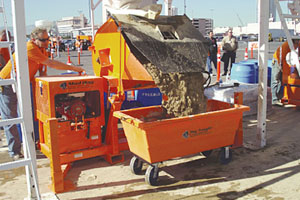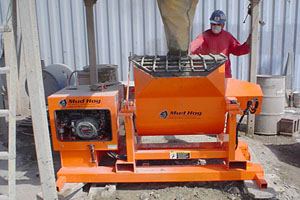Finding the Right Mixer

Dependable. Hard-working. Resilient. Well-mannered. These are all qualities that every employer strives to find in their employees. And every company can have at least one "employee" like this — just find the right portable mortar mixer. As many mason contractors can attest, buying a good mortar mixer is a major step toward increased productivity, expanding your business opportunities, and growing your profitability.
This article describes some of the key components of the modern mortar mixer, provides a little buying advice, and acquaints you with a few of the mortar mixer manufacturers in the United States.
"Before purchasing a mixer, the biggest consideration a mason contractor should weigh is whether they want to invest in performance, durability and options that are available with a quality mixer. If downtime is not an issue, long-lasting quality equipment is not the choice for them," said Damian Lang, owner and president of Lang Masonry Contractors Inc. and EZ Grout Corporation in Waterford, Ohio. EZ Grout produces the Mud Hog line of mixers.
A good tip to keep in mind when comparison-shopping: The upfront cost should not be the only factor; one should consider the overall cost of ownership as well. Here are a few questions to ask your sales representatives: How will the paddles hold up? How does the actual mixer itself hold up? How long will you have to wait to get your batches of mortar?
Another consideration is not only the durability of the components and parts of the mortar mixer, but also the availability of replacement parts. This view is one of the cornerstones of Toker Engineering Inc.'s business model for its line of mixers. Many of the key parts of its mortar mixers, such as the rubber paddle blades and transmission shafts, are made by third-party companies for Toker and other mixer manufacturers. This interchangeability is a major marketing tool for the Mexican company, which entered the U.S. market just six years ago.
"As a new manufacturer entering the United States market, that is an advantage for us because ... that gives [customers] more flexibility to buy our mixers," said Rafé Garcia, a U.S. division manager for Toker.
Further emphasizing its commitment to American mason contractors, Toker, which is the largest manufacturer of light construction equipment in all of Latin America, recently opened a distribution warehouse in Texas. With a U.S. distribution center, Garcia said, companies know they can get the equipment or replacement parts they need quickly.
Replacement parts can be found easily for most mixers on the market, but to prevent too many work stoppages, look for quality components. Of course, you will also want to learn about the materials used in manufacturing the components of each mortar mixer. This will help in determining the general cost of ownership.

Engines
Mortar mixers generally are built with either belt-driven motors or hydraulic engines.
Push-Button Masonry of Sherrill, Iowa, is introducing its first mortar mixer, the Mix-N-Place, to the market this spring. This hydraulic mixer is big enough to fill six tubs or three wheelbarrows.
"What we'll be able to do is take it to the mixing site and fill [the mixer] with mortar, and then take it to the tubs without having to bring the tubs to the mixing site," said Tom Cummer, president of Push-Button Masonry and owner of Cummer Masonry Inc. "By doing that, we'll be able to save a lot of forklift time."
With his new mixer, Cummer said he is filling a need for equipment that has been unavailable to him in his own masonry business. "I know some of the mixing manufacturers have built big enough mixers that they can mix four tubs of mortar at a time, but you still have to take the tubs back to the mixing site," he said.
The Mix-N-Place is part of what the industry is referring to as a slight trend toward heavier duty, higher capacity mixers. This trend includes the hydraulic mixers, which are more expensive than other mixers, and generally are employed by bigger contracting companies that need to mix larger loads. Additionally, these machines can operate in reverse to unplug mixes. Hydraulic mixers are beginning to increase in popularity, and more mixer manufacturers are producing hydraulic machines, including Toker Engineering, Multiquip Inc. and Buddy Equipment, whose first hydraulic units should be available later this year.
Jim Swisher, owner of Buddy Equipment in Jacksonville, Fla., said hydraulic mixers "give a contractor an ability he's never had before, especially at some job sites where they want to mix their own grout." Swisher sees these machines as a technological improvement for the industry, but for most mason contractors, "the father and son masonry crews," belt-driven mixers will remain the machine of choice.
The less expensive, belt-driven systems are the bread and butter for most mason contractors. Some of these machines may require a bit more attention, such as regular maintenance and replacement of worn parts, such as gears and belts, but they are the true workhorses of the masonry industry and continue to outsell all other powered mortar mixers.
So how do the various manufacturers, who are using similar engines, differentiate themselves from the competition? One way is through the engine housing or engine cap design.
For example, Buddy Equipment's new engine cap design allows his mixer to be operated with the engine cap closed. In fact, OSHA requirements mandate that engine caps be closed while the mixers are in use, but frequently crews ignore this mandate for convenience sake. Swisher said: "Because it is inconvenient for the engine caps to be closed because of the way they are designed, most people operate their mixers with the engine caps open."
Also, the front part of Buddy's new engine cap design encloses all of the mixer's drive components. This cabinet, therefore, keeps debris away from these components and promotes longer life for the mixer. Swisher said this innovation would make a major contribution to portable mortar mixer design.
Paddles and Drums
In daily use, what may matter most is the durability and efficacy of the paddles and drums. "If buying a paddle mixer, examine the paddle configuration and shape of the drum," said Warren Faler, product manager for Multiquip Inc. of Carson, Calif., which also manufactures mixers under the Essick and Stow brands. "Short deep drums are more efficient than long, shallow drums because the paddles don't have to move the material as far. Determine the drum capacity and power required. Look for thick metal drums. ... The mixer should have safety guards," he added, "providing operator protection and easy access for cleaning."
Steel is the most common material for drum construction, but steel grades and thicknesses can vary among manufacturers, so know what your general job requirements are before buying. For instance, Toker offers one of the thickest-grade steel drums — 3/16 inch — in the industry, which the company says is 50 percent thicker than other companies. Not that dry cleaning should be encouraged, but a thicker steel drum will prove its sturdiness the first time someone from your crew hammers away at the outside of the drum to remove dried mortar from inside. "People like it; the drum is very heavy so you can hammer it," Garcia said.
Interestingly, steel is not the only material being used for mortar mixer drums these days. More appropriate for dry cleaning conditions, polyethylene tubs are gaining in popularity. The plastic drums are easier to clean of dried material when compared with steel, they won't rust, and they are resistant to chemical corrosion. Multiquip introduced the first patented Easy Clean plastic concrete and mortar mixers in 1990, and the trend has slowly but steadily amplified.
"Day after day, more people are asking for poly drums," Toker Engineering's Garcia said. "By the end of the year, I hope that we can offer our new line of poly drums."
Other Components
Additional consideration should be given to drum locks, which add a level of safety and convenience when towing the mixers; and bearing housings, such as the bolt-on housings offered on Stow's mixers, which not only protect the bearings but also identifies when the seals need to be replaced. Many of the major mortar mixer manufacturers use sealed systems, including Multiquip, Toker Engineering and EZ Grout.
There also are theft deterrent systems to think about, such the ability to remove one or both wheels, and those mixers with forklift attachments that simply can be kept off the ground away from temptation.
Regardless of your needs or preferences, there is sure to be a mortar mixer on the market that is destined to become one of your favorite "employees." And while most manufacturers may take a similar approach to designing and building their mixers, each company is able to carve a niche for itself with its line of machines. Remember, competition breeds innovation, which benefits the customers or end-users. Like Swisher says, if there is just one dog in the race, it is not a race.
About the Author
Cory Sekine-Pettite is an editor for Lionheart Publishing and was the founding editor of Masonry Design magazine.


















